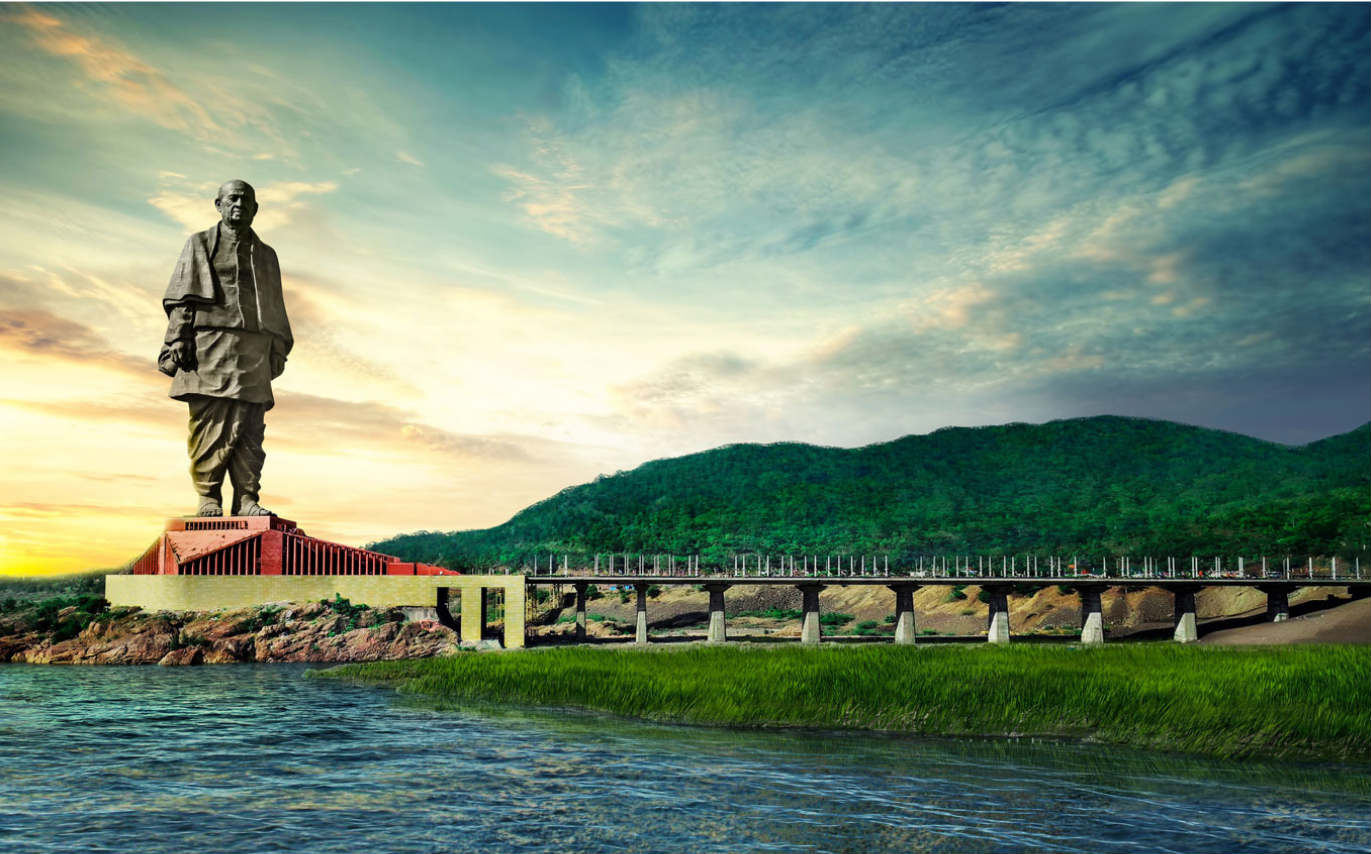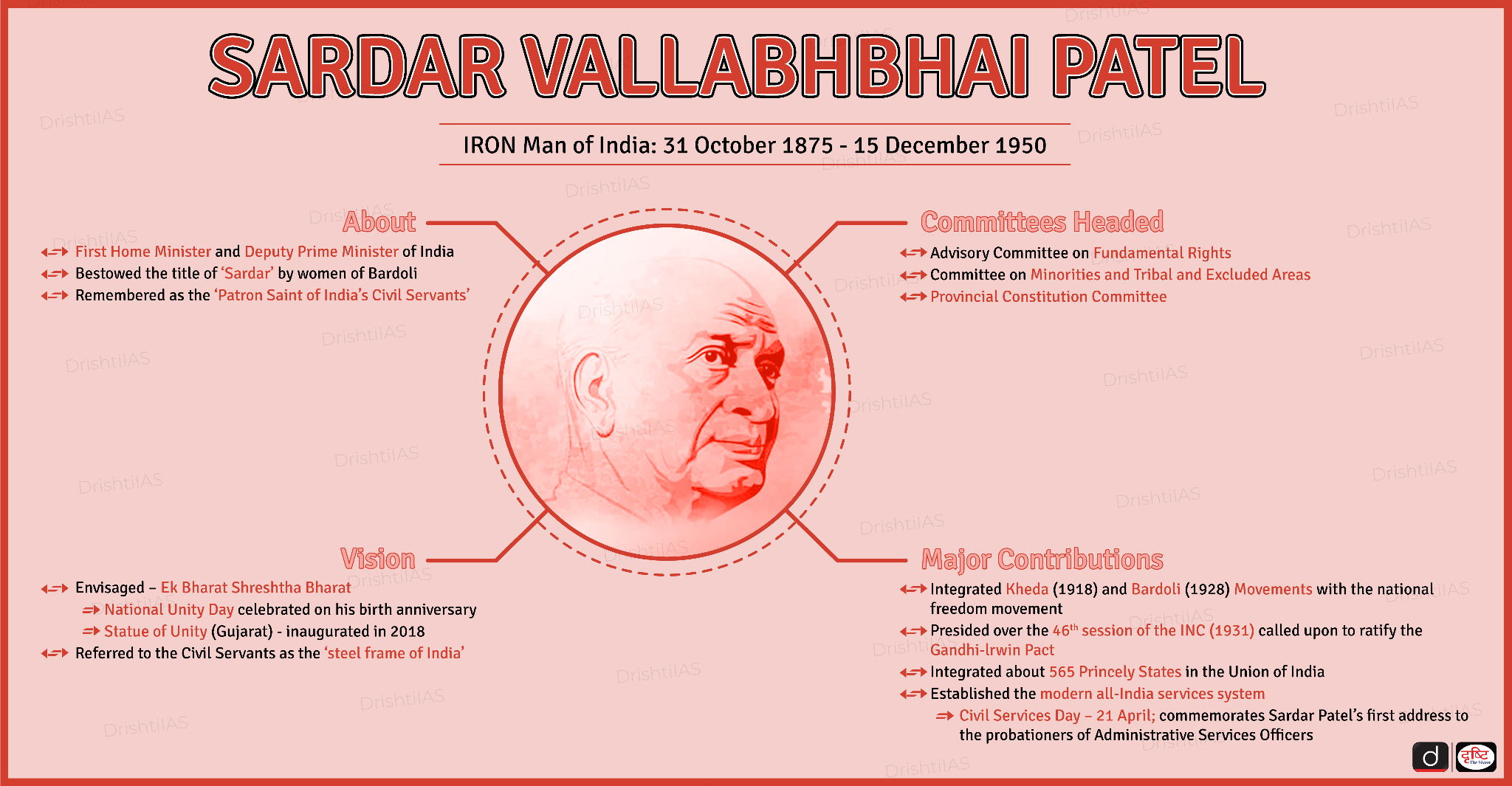Important Facts For Prelims
Birth Anniversary of Sardar Vallabhbhai Patel
- 04 Nov 2024
- 6 min read
Why in News?
Recently, the President of India commemorated Sardar Vallabhbhai Patel's 149th birth anniversary, observed as National Unity Day (31st October), honouring the legacy of India's first Deputy Prime Minister and Home Minister.
What is National Unity Day?
- About:
- National Unity Day serves as a reminder of the values Patel embodied—unity, integrity, and inclusiveness.
- In a country characterized by its vast diversity in cultures, languages, and religions, National Unity Day emphasizes the importance of fostering a sense of solidarity among the Indian populace.
- The day encourages citizens to reflect on the necessity of coming together to overcome challenges, celebrate diversity, and promote harmony within the nation.
- National Unity Day serves as a reminder of the values Patel embodied—unity, integrity, and inclusiveness.
- Statue of Unity:
- On 31st October 2018, the Statue of Unity, the world’s tallest statue at 182 meters (600 feet), was inaugurated at Kevadia, Gujarat, honouring Sardar Vallabhbhai Patel.
- Overlooking the Narmada River and the Sardar Sarovar Dam (the second largest gravity dam worldwide by concrete volume), the statue is situated on Sadhu Bet hillock.
- In 2020 India's Statue of Unity was included in the list of eight wonders of the Shanghai Cooperation Organisation (SCO).
- On 31st October 2018, the Statue of Unity, the world’s tallest statue at 182 meters (600 feet), was inaugurated at Kevadia, Gujarat, honouring Sardar Vallabhbhai Patel.
Who was Sardar Vallabhbhai Patel?
- Birth: Born on 31st October 1875, in Nadiad, Gujarat.
- His family belonged to the Lewa Patidar community.
- Career: Completed law studies in England, earning a prize in Roman Law, and returned to India as a barrister in 1913.
- Title and Legacy: Popularly known as the "Iron Man of India" for his determination and firm approach. He is revered as a symbol of national unity and resilience.
- Political Rise:
- Joining the National Movement: Patel was inspired by Mahatma Gandhi and joined the freedom struggle.
- Kheda Satyagraha (1918): He played a pivotal role in Kheda Satyagraha demanding tax exemptions for farmers affected by crop failure due to drought.
- Bardoli Satyagraha (1928): Led the resistance during the Bardoli Satyagraha against an unjust tax increase, earning him the title "Sardar" for his leadership.
- Role in the Indian National Movement:
- Non-Cooperation and Civil Disobedience: Embraced Gandhi's vision, leading actions like the Salt Satyagraha in 1930 and facing multiple imprisonments for his involvement.
- Presiding Over the Congress: Chaired the 46th session of the Congress in 1931, navigating through the Gandhi-Irwin Pact discussions.
- Quit India Movement (1942): Patel was arrested and imprisoned during this major phase of India's freedom struggle.
- Contributions Post-Independence:
- Integration of Princely States: Spearheaded the integration of 562 princely states into the Indian Union, securing stability and democracy for millions.
- The Indian Independence Act of 1947 allowed princely states to declare independence.
- Reinforcing India’s Civil Services: Patel was instrumental in establishing the modern All India Services, strengthening the administrative framework of the country.
- Remembered as the "patron saint of India’s civil servants" for his contribution to reinforcing the bureaucratic system.
- National Civil Services Day (21st April) honors Sardar Patel's 1947 speech, calling civil servants "the steel frame of India" and reinforcing their dedication to public service.
- Chairmanship and Committee Work: Led the Advisory Committee on Fundamental Rights, Minorities, and Tribal and Excluded Areas in the Constituent Assembly.
- Integration of Princely States: Spearheaded the integration of 562 princely states into the Indian Union, securing stability and democracy for millions.
UPSC Civil Services Examination, Previous Year Questions (PYQs)
Prelims
Q. What was the reason for Mahatma Gandhi to organize a satyagraha on behalf of the peasants of Kheda? (2011)
- The Administration did not suspend the land revenue collection in spite of a drought.
- The Administration proposed to introduce Permanent Settlement in Gujarat.
Which of the statements given above is/are correct?
(a) 1 only
(b) 2 only
(c) Both 1 and 2
(d) Neither 1 nor 2
Ans: (a)
Q. For the Karachi Session of Indian National Congress in 1931 presided over by Sardar Patel, who drafted the Resolution on Fundamental Rights and Economic Programme? (2010)
(a) Mahatma Gandhi
(b) Pandit Jawaharlal Nehru
(c) Dr. Rajendra Prasad
(d) Dr. B. R. Ambedkar
Ans: (b)






